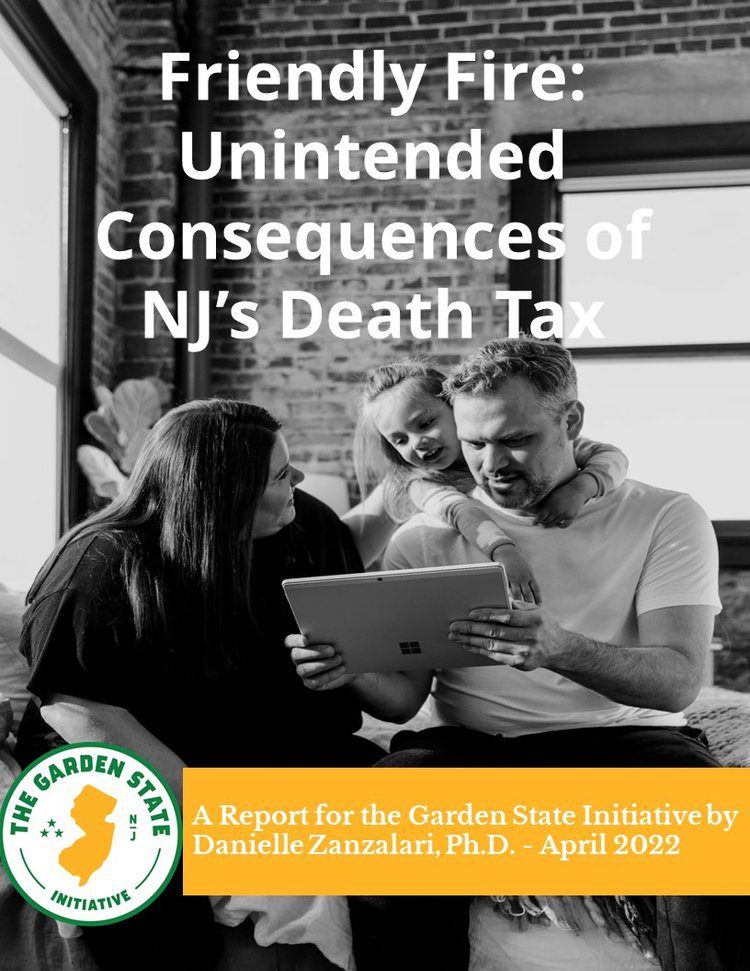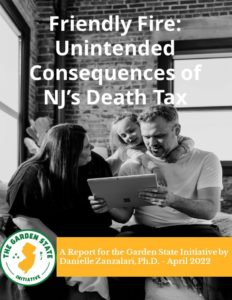Public Spending, ECONOMIC OPPORTUNITY FOR ALL
Friendly Fire: Unintended Consequences of NJ’s Death Tax

Garden State’s antiquated Death Tax disproportionally hurts working class residents
 As New Jerseyans recently rushed to complete their annual tax filings, many were reminded of an unfortunate reality – the Garden State remains one of just six states to collect a Death Tax, or tax on inheritances. As GSI documents in a new report, Friendly Fire: Unintended Consequences of NJ’s Death Tax, the enforcement of this tax has wide-ranging implications for residents, businesses and our competitive standing.
As New Jerseyans recently rushed to complete their annual tax filings, many were reminded of an unfortunate reality – the Garden State remains one of just six states to collect a Death Tax, or tax on inheritances. As GSI documents in a new report, Friendly Fire: Unintended Consequences of NJ’s Death Tax, the enforcement of this tax has wide-ranging implications for residents, businesses and our competitive standing.
“This report should be required reading for policymakers concerned about our state’s competitiveness and the fairness of our tax code,” stated GSI’s president Regina M. Egea. “The reality is that this tax hurts our economy, encourages retirees to flee the state and places an undue burden on the working and middle classes who don’t have the resources the wealthy do to structure their assets to avoid inheritance taxes.”
The report, authored by Danielle Zanzalari, Ph.D., Assistant Professor of Economics at Seton Hall University, documents the history of the tax and notes that New Jersey is one of only six remaining states with an Inheritance Tax, also called a Death Tax. The New Jersey law states that if one dies and wants to leave money to their sibling or niece/nephew, the beneficiary must pay an inheritance tax on the value. However, if the relationship to the decedent is different, such as a child, then no inheritance tax may be levied.
“Often times people think that an inheritance tax only hurts the rich, but in reality, an inheritance tax creates economic inefficiencies that hurt the young and elderly, many whom are not wealthy at all,” stated Dr. Zanzalari, the report’s author.
Among the key findings of the report, Dr. Zanzalari writes that the Inheritance Tax:
-
Creates economic inefficiencies for individuals by forcing residents to alter their economic behavior to avoid the tax. Research shows the inheritance tax causes owners to sell their businesses early and leads to a decrease in new businesses started, both of which impede economic growth. Another inefficiency created by the inheritance tax is that beneficiaries who inherit property, like a farm, may be forced to sell it quickly in order to pay off the tax.
-
Incentivizes relocation for retirees to more tax-friendly states. If people leave the state there is not only a loss in inheritance tax revenue but also other tax revenues, which has an even larger impact on the state. Beyond losing tax dollars, New Jersey also loses an economic base that spends money and owns businesses.
-
Disproportionally impacts individuals that are not wealthy. Those that can afford accountants and lawyers are the ones that can avoid the inheritance tax by moving out of state or setting up gifts and trusts ahead of their death. As a result, those that cannot afford to do this (the less wealthy and elderly) or individuals who die unexpectedly bear the burden of the inheritance tax. A study from Iowa, which has repealed its tax effective in 2025, showed that 92.5% of all inheritance taxes were assessed on households with an adjusted gross income of $80,000 or below.
-
Is an unreliable revenue source for the state. Despite a surge in Inheritance Tax revenue as a result of the pandemic, analysis shows that it is very difficult to rely on inheritance tax as a primary source of tax revenue due to the difficulties in predicting death rates, and how likely people are to move out of the state or employ tax avoidance strategies.
“With a tax burden among the highest in the nation, things will not change overnight in New Jersey” stated Ms. Egea. “But, by repealing the antiquated and regressive Death Tax in this year’s budget, the legislature and Governor can make good on their rhetoric about making our state more affordable and competitive for residents and investment.”
Dr. Zanzalari, and financial planner Sharif Mohammed, MBA, CPA, the founder and owner of Unlimited Capital Advisors, LLC, discussed the report with GSI’s Regina Egea in the latest edition of The GSI Briefing podcast which you can listen to by clicking below.

